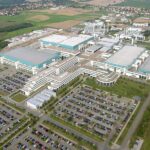
Hadrian is a premium-grade machining solution designed to improve quality and quantity accuracy, while helping users to reduce machining costs. In today’s manufacturing environments, where efficiency and performance are key factors, Hadrian stands out as a reliable option suitable for various machining needs. This article will explore the benefits of using Hadrian in terms of precision accuracy, cost-effectiveness, and improved productivity.
Precision Accuracy: By incorporating hadrian into the machining process, you can greatly increase the accuracy of your parts and products. Hadrian has been designed to eliminate voids in welding lines by controlling the variability in radii during machining operations. This helps to ensure that each part or product is produced with exacting accuracy and maximum quality.
Cost-Effectiveness: Hadrian’s cost-efficiencies make it an attractive choice for those looking to increase operational efficiency without sacrificing accuracy or quality for their finished products. Hadrian allows users to minimise wastage material by ensuring that only the necessary materials are used for a particular job, eliminating unnecessary scrap. The result is a decrease in material costs associated with production runs.
Improved Productivity: Hadrians’ features also help to optimise productivity and reduce labour costs associated with manual activities such as tool changes, setting workpiece orientations, etc., which are often time consuming and costly pursuits when performed manually. Additionally, comprehensive data logging and remote diagnostic capabilities allow manufacturers to analyse production processes quickly and efficiently to identify areas of opportunity for increased performance or profitability within their organisation.
What is Hadrian?
Hadrian is an advanced machining and engineering software package for the automotive and manufacturing industry. The software is extremely versatile, allowing companies to design and manufacture a wide range of components, from body panels to chassis and transmission parts. In addition, Hadrian provides engineers with several invaluable features that help improve speed, accuracy and safety in their machining processes.
The features included in Hadrian can reduce the cost of producing parts by reducing the need for specialist tooling and machinery. As such it can reduce costs associated with waste materials due to flaws caused by errors or inaccuracies caused by manual measurement or part checking methods.
Hadrian also allows engineers to see real-time data on their parts at any stage during production, ensuring maximum accuracy and consistency in production runs. In addition, Hadrian has a range of built-in simulation programs which enable users to view prototypes within the software before they start building them, reducing time spent prototyping new products. Also included within Hadrian are a range of CAD/CAM software packages allowing users to create detailed plans for the production process within their CAD/CAM systems.
In conclusion, Hadrian offers engineers numerous benefits, making it an invaluable machining tool for product designers. From its ability to reduce costs associated with tooling waste materials, its capacity for real-time data analysis during product creation stages, and its capacity for designing 3D prototypes before physical products are manufactured – all of these features combine to provide powerful capabilities when creating high precision components.

Advantages of Hadrian
Hadrian is a computer-controlled machine tool revolutionising the machining industry by providing an easier and more efficient way to create parts and components. Hadrian utilises computer numerical control (CNC), robotic automation, and 3D printing technology to make the machining process easier, faster, and more accurate.
In this section, we will look at Hadrian’s advantages to machining operations.
Increased Efficiency
When you need fast and precise machining, Hadrian can help. This computer numerically controlled (CNC) technology helps organisations fabricate, produce and finish parts quickly with the highest levels of precision and accuracy. Additionally, its software complexity is often more straightforward than other CNC technologies, allowing users to set up jobs faster and more easily.
Hadrian’s ease of use is part of what makes it such an efficient manufacturing solution. For instance, its open-concept architecture allows any two machines to communicate with each other in real time, enabling a production environment that runs more efficiently while freeing workers from having to manually input data into multiple machines. Furthermore, updates can be rolled out remotely within minutes without manual installation or control manipulation — helping reduce downtimes.
Additionally, Hadrian offers greater control over operations and processes by providing detailed shop-floor data about individual machines performance or entire production lines so that operators can optimise by implementing corrective actions based on historical trends. Lastly, with its automated reporting capabilities, users can avoid redundancies by quickly capturing information directly from the machines themselves for further analysis or decision making in time frames well beyond manual methods’ capabilities.
In summary, Hadrian offers increased efficiency through its easy-to-use software architectures and automated reporting capabilities, which equates to improved production output and provides measurable cost savings throughout the machining process, improving both efficiency and financial bottom line results.

Improved Accuracy
Hadrian’s use for machining offers various benefits over manual machining processes. Notably, it is known for providing highly precise and accurate results. This improved accuracy is largely due to Hadrian’s ability to machine from solid material blocks without tooling changes or setup time. Furthermore, Hadrian runs entirely under software control, allowing machines to follow programs which minimise the possibility of operator error.
Additionally, Hadrian can incorporate high-precision linear movement stages, allowing the machine to move parts more precisely than ever before and with minimal vibration. This high degree of control enables manufacturers to produce parts with better repeatability and greater complexity than possible when relying on manual operations alone.
Finally, improved safety is another advantage of Hadrian machinery due to its closed-loop system design and low risk of unanticipated downtime due to operator errors or faulty-programming. These features make automated processing ideal for companies that require consistent results from their processes without constant supervision from personnel onsite.
Reduced Cost
One of the primary advantages of using Hadrian technology for machining is a cost reduction. By automating the machining process, manufacturing costs are significantly lowered and there is much less wasted material due to precise programming. The system is also less labour-intensive than manual machining, allowing operators to focus on more important tasks and achieve higher levels of production efficiency.
By combining precision cutting with automated systems, Hadrian helps to reduce cycle times significantly, increasing productivity and improving product quality. In addition, single setup operations can be used for multiple machine tools to increase throughput quickly with minimal disruption. This allows manufacturers to reduce lead times and down time, resulting in a much more efficient production environment.
How Hadrian is Changing the Machining Industry
Hadrian is a powerful, versatile machine that is revolutionising the machining industry. It offers a variety of features that make machining faster, easier, and more accurate than ever before.
In this article, we’ll discuss the advantages of using Hadrian for machining and how it is changing the machining industry.

Automation of Processes
In the machining industry, automation of processes is becoming increasingly popular. Automation allows machines to run more quickly and efficiently than a human operator can, resulting in shorter cycle times and reducing the likelihood of production errors. Additionally, automated processes require minimal human input – reducing a company’s need for labour costs. This also increases safety for employees working onsite in machining operations.
Hadrian is one such automation technology that many modern machining operations have embraced – providing businesses greater control and reliability in their production line. By connecting existing equipment into an automated network, Hadrian reduces the complexity of operations while ensuring greater accuracy in results. With its integrated programming system, setup and maintenance are simple – allowing staff members to be trained quickly on the system without needing an extensive understanding of its components. Furthermore, Hadrian enables operators to monitor progress remotely – allowing them to see progress updates live with minimal effort or disruption required.
Through its combination of reliable performance, easy use, and lower long-term costs, Hadrian is revolutionising the machining industry by creating new opportunities for cost savings and improved results for businesses utilising its technology.
Improved Quality Control
Using Hadrian for machining can offer better quality control for the finished product and during the machining process itself. With the precision and consistency of Hadrian’s expertly designed machine tools, operators can be sure that each piece meets its exact specifications from start to finish. In addition, by leveraging advanced software, users can ensure that the data collected is accurate and up-to-date so there are no surprises regarding quality assurance or safety standards.
Furthermore, with the real time feedback provided by sensors and actuators on the machine tool, companies can better track and monitor fatigue or other potential issues with its machines. Early detection of abnormal system behaviour due to sudden shocks or extreme temperatures can help operators avoid costly downtime repairing parts or entire machines. Having real-time thermal information of a cutting tool directly integrated into motion controllers enables more efficient use of energy, reducing costs associated with machining materials. This improves overall production efficiencies and further ensures a consistently high standard for product quality control.
Greater Flexibility
Hadrian’s advanced CNC (Computer Numerical Control) technology for machining allows for greater flexibility than ever before. This technology leverages the latest software, machine design, and automated processes to cut production cycles and increase efficiency. With the ability to quickly adapt to changing orders or product designs, CNC from Hadrian helps minimise downtime and increase output. As a result, machinists can easily create complex parts in significantly less time than traditional methods.
CNC also helps reduce labour costs associated with manual machining as much of the labour input is automated with programming instructions. This allows machinists to complete several projects in half the time. Hadrian also offers comprehensive training courses and access to professional support engineers who can help troubleshoot and set up new machines or upgrades when needed.
Compared with other machining solutions, Hadrian’s CNC is user-friendly, cost-effective, and incredibly versatile – able to produce any type of part from complex moulds and simpler ones like bushings or fixtures quickly and accurately. By leveraging cutting-edge technologies such as additive manufacturing and robotic automation combined with CNC processes, Hadrian is revolutionising how parts are designed and manufactured today!



